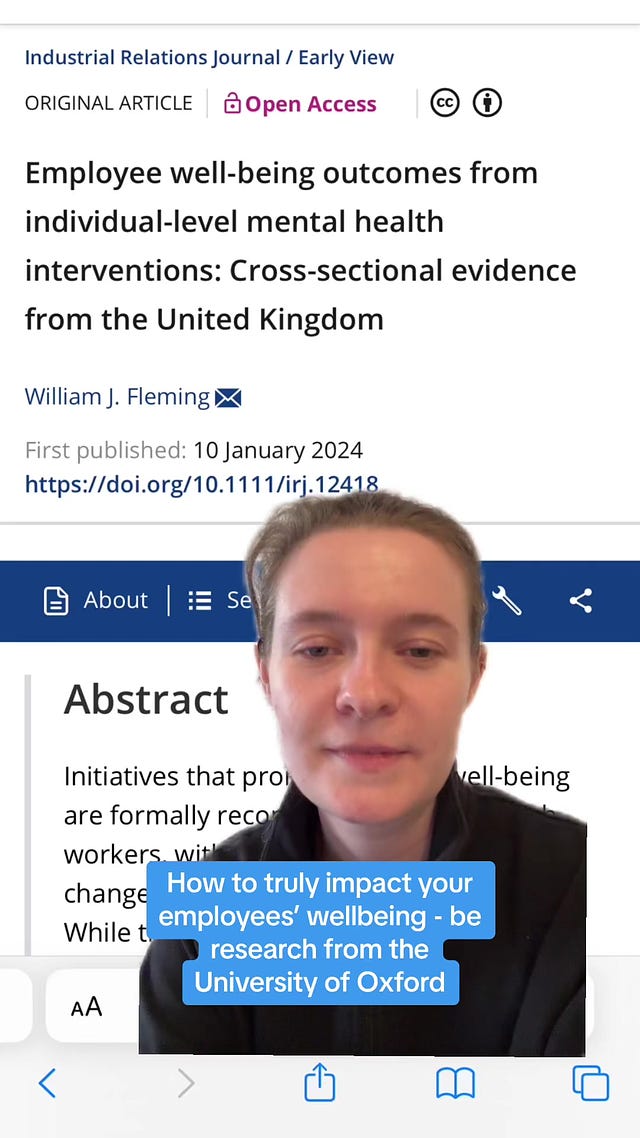Your team doesn't trust you & here's why...
ALSO: Paul from The Traitors is "fundamentally HR"
Trust is at the heart of good workplace culture
Can you work with someone if you don't trust them?
When times are hard we can find that we need to have difficult conversations about the team, often conducted in private. How is that person performing? Will this person’s performance improve?
Decisions are often made by leaders that team members don’t understand or don’t have explained to them.
Gradually, unintentionally trust starts to break down. Managers make excuses for themselves, saying that normal order will be restored as soon as conditions pick up.
But it’s inescapable, good workplace culture cannot exist without trust.
That’s why the Edelman Trust Index is worth reading. It’s a brilliant analysis of how trust is created and what leaders can do to sustain it.
The new report was released this week. It’s timely because elsewhere new insight this week found that a quarter of employees don’t trust their CEO. Edelman says lower earners are starting to believe they're being tricked: there is a growing trust gap between the top quartile of earners and the lowest quartile.
We often overlook the fact that trust is the basis for all good culture. I called out some of the remarkable data on this in the Work In 2024 deck.
In Slack’s August 2023 survey of over 10,000 global office workers, trust was the top determinant of employees’ productivity scores. Employees who felt trusted were 2X as productive as those who didn’t. They were 30% more likely to put in extra effort at their jobs. If we don’t feel trusted we’re twice as likely to say we’re looking for a new job.
But what role does trust play in the modern company? And how can we build it?
Mark McGinn is a senior leader at the communications agency Edelman, he talks to me about their research into trust and how we should seek to build it.
Has our organisation replaced government? Increasingly our company is the biggest thing that we believe we can have an impact on.
Listen: Apple / Spotify / website
You'll strongly enjoy downloading Edelman's Trust Barometer and also Edelman's special Trust at Work report.
'We aren't asking, we are informing'
The danger of doing a company wide video demanding that workers return to the office is that it could potentially leak and create embarrassment. Here's the highlights of the new video from the CEO of Web MD. Vice wrote some more about it before it ended up going everywhere.
Along the same vein: With more and more of us working from home an increasing number of redundancies have been done remotely. There’s a growing trend of these firings being recorded and posted to TikTok. Here’s one where one organisation, Cloudfare, is filmed trying to dismiss someone for underperformance only to be confronted by a very well prepared employee. This second film is someone at Discord capturing her moment of dismissal
More than 60% of Gen Z workers say ‘employees should only do the work they are paid for - no more, no less’ but do they have a negative attitude towards work? This article in The Times gives a slightly spiky take on this debate. Includes this quotation:
“One friend, a 33-year-old communications manager, tells me of her surprise that all four of the under-25s she manages have never considered logging into work emails on their phone. Instead of chowing down a salad over their keyboards at lunchtime, they take a full one-hour break. At the end of each day, they clock off at 6pm sharp” (funny tweet about this)
Interestingly on the same lines Slack published their latest batch of research just before Christmas. Their conclusion was that 2 out of every 5 workers report experiencing pressure to regularly work after hours, not because they want to because they are pressured to. Those workers who work after hours experience twice as much burn out and stress, and feel 20% less productive during their working day. Other findings:
1 in 4 say they spend too much time in meetings (this rises to 55% of executive leaders)
1 in 5 say they don’t have enough time to connect with colleagues
half of all desk workers say they don’t take breaks during the day
“They want to do lunch, every single day they want to grab lunch with me… I’ve got phone calls to make, I wanna be on IG scrolling” - this young person’s response to colleagues’ social connection has polarised responses. (I know introverts have always struggled with demands to hang out, I suspect it just looks a little different here)
I really liked this piece using workplace metaphors about The Traitors UK:
“The reason Paul is so compelling is because he’s the type of villain we meet all the time; the sort of minorly sinister individual whose eyes light up as they’re slapping you with a day-ruining inconvenience – an assassin in a Folk chore jacket, whose haircut you’re annoyed you find yourself admiring. Paul is an estate agent smiling to your face as he tells you that “on this occasion” the landlord won’t be paying to replace the washing machine. He is the doctor’s receptionist white-knuckling a power trip as she tells you that the next phone appointment is in two weeks’ time... Paul, fundamentally, is HR.”
If you work in management or HR this is essential viewing: you might have seen this TikTok breaking down a recent piece of research into workplace wellbeing. TL;DR wellbeing initiatives for individuals had zero impact on wellbeing, whereas cultural changes (like 4 day weeks, flexibility) did. Worth a watch - share it with your team for an interesting discussion starter:








I love the topic of trust in the workplace. Trust is tricky - you don't really know if it's there until it's put to the test, and if trust is broken on the 1st test it's incredibly difficult to get back!